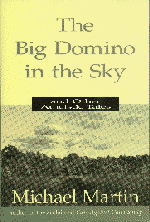
Can a non-believer (i.e. atheist) be moral? Is one morally obligated to believe or not believe, considering the lack of evidence for god or gods? Are there any good arguments for the existance of god or gods? What are some of the flaws in theistic apologetics such as the Argument by Design and the Ontological Argument? Does the existance of the Cosmos require a Prime Mover, and if so, must it be a god or gods? Are agnostics really atheists, clothed in a less threatening label? Since there is no god or gods, is "everything permitted?" Since there are so many gods, how does one choose which one(s) to believe in?
This book is lots of fun. It is witty, reasonable, and sharp in its criticisms and insights. It projects historical arguments into a fantasy world (science fiction), where theistic apologetics may be examined, at times, from an alien point of view.
Unfortunately, I kept waiting for the author to expand that view, but he never quite does so. The alien race in the book is polytheistic, with a very tiny number of atheist individuals. The reader can understand why the author selected a polytheist alien race (it contrasts sharply with humanity's dominate monotheism), but I think a race of non-theists would have been a better contrast, along with the polytheist race. Think of how astonished an alien race of non-theists would be if they found that the vast majority of humans believe in what clearly does not exist!
The book is writen as a series of short stories, linked by common themes and by common characters.
Religious hypocracy is examined in subtle ways, such as the chapter called "The Miracle Sleuth." Suppose the Vatican were to actually do a scientific study of miracles, and discover (to no atheists' surprise), that there is no evidence for them? Would they tell their Catholic followers? The answer to that question also comes as no surprise to atheists.
Or suppose one were a confidence man, out to skin a sucker or two for every dollar one can. Wouldn't Pascal's Wager be a sucker's bet? Ask Frenchy, who taught the Wager / scam to Fast Eddy and Subway Slim. Martin presents a few of the many problems with Pascal's Wager, that theist apologists seldom consider.
Throughout the book, The Preacher With No Name rides. He is a wanderer, out to spread the word of God-Free. God-Free for humanity is the goal of his Houses of Nonbelief, which number 4,999 throughout the known galexy. God-Free is achieved in steps: God-Fall, God-Doubt, God-Rejection, and finally God-Free. It is a worthy goal, but The Preacher With No Name has doubts that his message is being heard and remembered.
My wish is that theist apologists would read this book and consider the criticisms Professor Martin presents. I'm sure they would have endless counter-arguments, but maybe (just maybe), a little God-Doubt may befall them.
On the Shy David Book Review Scale from one to six stars (six
being best), I think this book deserves
![]()
![]()
![]()
![]() four stars.
four stars.